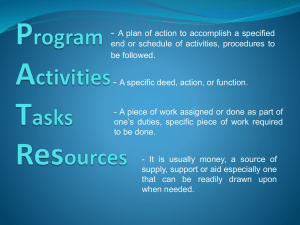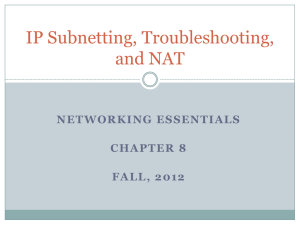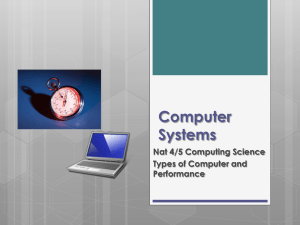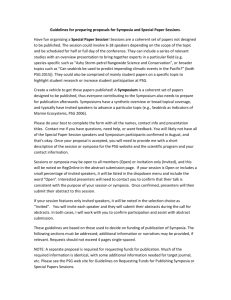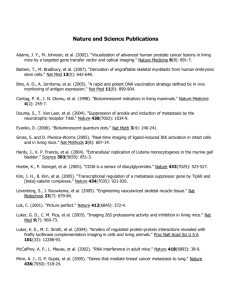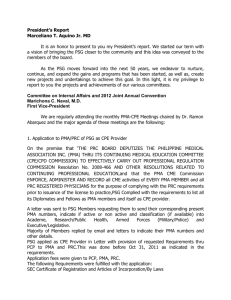PSG FS Work programme 2015-2018
advertisement
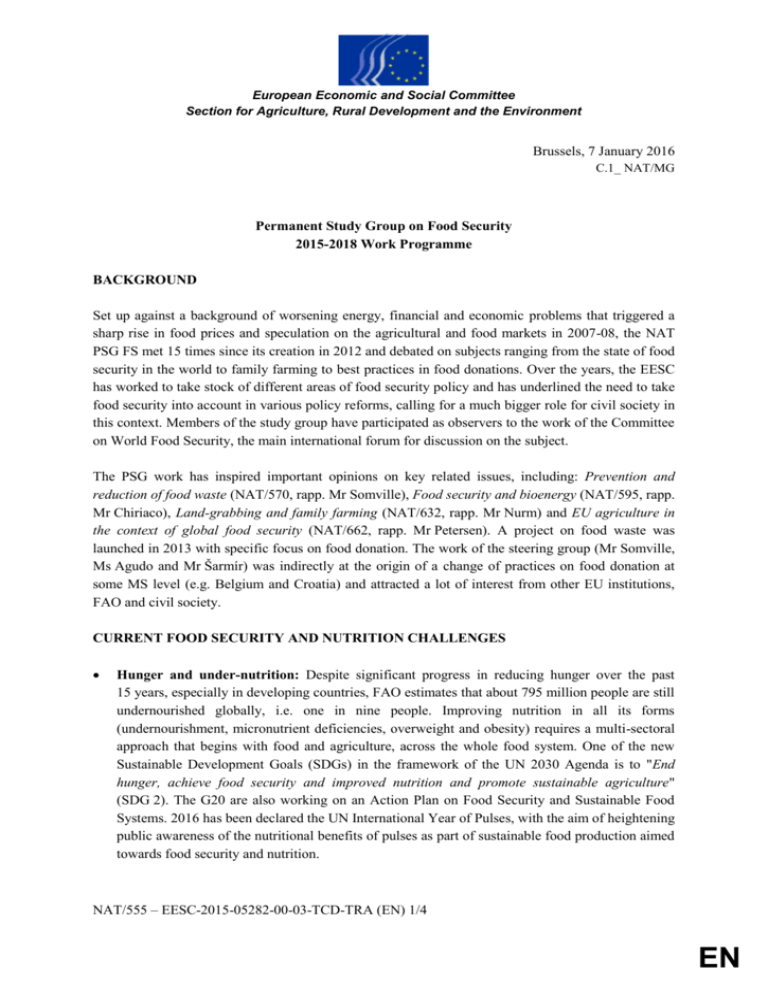
European Economic and Social Committee Section for Agriculture, Rural Development and the Environment Brussels, 7 January 2016 C.1_ NAT/MG Permanent Study Group on Food Security 2015-2018 Work Programme BACKGROUND Set up against a background of worsening energy, financial and economic problems that triggered a sharp rise in food prices and speculation on the agricultural and food markets in 2007-08, the NAT PSG FS met 15 times since its creation in 2012 and debated on subjects ranging from the state of food security in the world to family farming to best practices in food donations. Over the years, the EESC has worked to take stock of different areas of food security policy and has underlined the need to take food security into account in various policy reforms, calling for a much bigger role for civil society in this context. Members of the study group have participated as observers to the work of the Committee on World Food Security, the main international forum for discussion on the subject. The PSG work has inspired important opinions on key related issues, including: Prevention and reduction of food waste (NAT/570, rapp. Mr Somville), Food security and bioenergy (NAT/595, rapp. Mr Chiriaco), Land-grabbing and family farming (NAT/632, rapp. Mr Nurm) and EU agriculture in the context of global food security (NAT/662, rapp. Mr Petersen). A project on food waste was launched in 2013 with specific focus on food donation. The work of the steering group (Mr Somville, Ms Agudo and Mr Šarmír) was indirectly at the origin of a change of practices on food donation at some MS level (e.g. Belgium and Croatia) and attracted a lot of interest from other EU institutions, FAO and civil society. CURRENT FOOD SECURITY AND NUTRITION CHALLENGES Hunger and under-nutrition: Despite significant progress in reducing hunger over the past 15 years, especially in developing countries, FAO estimates that about 795 million people are still undernourished globally, i.e. one in nine people. Improving nutrition in all its forms (undernourishment, micronutrient deficiencies, overweight and obesity) requires a multi-sectoral approach that begins with food and agriculture, across the whole food system. One of the new Sustainable Development Goals (SDGs) in the framework of the UN 2030 Agenda is to "End hunger, achieve food security and improved nutrition and promote sustainable agriculture" (SDG 2). The G20 are also working on an Action Plan on Food Security and Sustainable Food Systems. 2016 has been declared the UN International Year of Pulses, with the aim of heightening public awareness of the nutritional benefits of pulses as part of sustainable food production aimed towards food security and nutrition. NAT/555 – EESC-2015-05282-00-03-TCD-TRA (EN) 1/4 EN Food waste: About one-third of food produced for human consumption is lost or wasted - with food waste occurring throughout the supply chain, at all phases between agricultural production and household consumption. Environmental impacts of food production and consumption: Food is also one of the most important drivers of environmental pressures, particularly in terms of water and resource use, greenhouse gas emissions (GHGs), pollution, and subsequent climate and habitat change. Agriculture’s role on mitigation to and adaptation of climate change has gained prominence in recent years. Urbanisation and migration: Rural exodus remains an important challenge to address. Promoting relevant and rewarding employment and revitalising rural areas are vital to counterbalance the seemingly unstoppable attraction for urban life. At world level, about 5 billion people are expected to live in cities by 2030 - or 60% of the then projected global population. This has huge implications on land use and sustainability of supply chains, and implies that production and consumption patterns will have to be totally rethought. In the EU, migration from countries facing conflicts risk reinforcing urbanisation trends. Social protection: today, around 150 million people stay above the poverty line thanks to social protection programmes that help reduce hunger and malnutrition by promoting income security and improving access to better food, health care and education. Therefore, weakening social protection mechanisms due to reduced public spending represents a further challenge to food security and nutrition, especially in rural areas. OBJECTIVES 2015-2018 Overarching objective: Promote sustainable food systems for food security and nutrition In cooperation with EESC sections and principally with the NAT Section, the PSG FS intends to tackle the issue of food security in a more holistic manner, e.g. by promoting sustainable agricultural production while ensuring "the right to food" and appropriate nutrition for the Earth's growing population, reducing food loss and waste, enhancing sustainable consumption and promoting economic rural development. The PSG aims to support civil society's increasing demands about the environmental, social and economic impacts of food production and consumption, as well as hold governments and international development organisations accountable for their targets. Although the focus of the PSG work remains on food security, food safety aspects will also be considered as relevant to ensure and improve the security of food supply. Work priorities and measures: The PSG FS will focus on the following areas and measures to strengthen food security and food sustainability policies and to increase civil society's role therein: Promoting sustainable agricultural production through concrete actions relating to effective policies for sustainable agriculture, job creation in rural areas, support for smallholders, women and youth, further involvement of private sector and civil society, secure land tenure, better NAT/555 – EESC-2015-05282-00-03-TCD-TRA (EN) 2/4 nutrition, etc. Particular attention will be paid to the importance of promoting sustainable soil management and enhancing soil productivity for agriculture as the foundation for food security. Issues such as soil erosion by water and the land degradation process will be tackled in this context. The planned Farmer's Category conference in summer 2016 on sustainable production in the food sector will compliment these objectives. Possible measures: follow-up of EESC Opinion NAT/632 on land grabbing and family farming and other related Opinions, e.g. with participation in the FMAT1 2016 Conference; participate in the 2016 UN International Year of Pulses with a hearing or other event; ensure that concerns and possible solutions about sustainable agricultural production are integrated in any new initiative on the CAP; hearing or event on sustainable soil management as a follow-up of 2015 International Year of Soils. Promoting more sustainable agro-food supply chains. Food security is enhanced if food supply chains operate efficiently. More sustainable and efficient food systems could be realised by encouraging fair and transparent relations between farmers, processors and retailers as well as by promoting shorter food supply chains. Over recent years, there has been a shift in bargaining power in the supply chain, often to the advantage of the retail sector and to the detriment of primary producers. The position of the most vulnerable actors, such as farmers, should therefore be addressed, in particular by ensuring that prices paid to farmers allow them to make a fair profit. Possible measures: consider the possibility of recommending robust EU legislation to tackle big retail's dominant position within the food chain (in close cooperation with the INT Section) possibly through an own-initiative opinion on sustainable/fairer agro-food supply chains. Preventing and reducing food waste. The PSG will continue its efforts to promote policies for the prevention and reduction of food waste at the retail and consumer levels as well as of food losses along production and supply chains. In particular, dissemination and exchange of best practices on food donation across EU Member States will remain a priority for action as a way to address food poverty and food waste. Possible measures: further activities on food donation at EU and national level as well as on proposing innovative ways to further mobilise and engage civil society on food waste (possible exploratory or own-initiative opinion). Cross-cutting measure: exploratory opinion "Towards more sustainable food systems" at the request of the Dutch EU Presidency, covering the above-mentioned areas and building on the outcome of the Milan Expo 2015. To achieve the above objectives, the PSG will have to deploy efforts in the following three crosscutting enabling areas: 1 Stressing the educational and social dimensions of food security. The PSG will focus on the importance of education and training of farmers, manufacturers, retailers and other operators along the food chain on how to improve food quality, ensure food safety and reduce food waste. Forum mondial sur l'accès à la terre, World Forum on Access to Land. NAT/555 – EESC-2015-05282-00-03-TCD-TRA (EN) 3/4 The PSG will also analyse how the economic crisis has affected access to sufficient and nutritious food for the most deprived. Possible measures: study and/or own-initiative or exploratory opinion on training and education along the food supply chain; hearing followed by study and/or own-initiative opinion on the social dimension of food security in Europe (both in collaboration with SOC). Integrating food security considerations in other policy areas, including CAP, agricultural trade, international trade agreements, water management, sustainable development and climate change, social protection, migration and urbanisation, etc. This includes following up very closely the work of the other EESC Sections to influence food security relevant-contents. Possible measures: keep food security and food sustainability high on the agenda of the ACPEU Follow-Up Committee (REX) and SDO work on the UN Sustainable Development Agenda, identify potential cooperation with SOC and INT on upcoming opinions or owninitiative opinions. Monitoring and assessing EU and international policy from a civil society perspective Possible measures: continuing cooperation with the European Commission, the FAO and the CFS as well as stepping up cooperation with other international organisations, such as the International Fund for Agricultural Development (IFAD). _____________ NAT/555 – EESC-2015-05282-00-03-TCD-TRA (EN) 4/4
